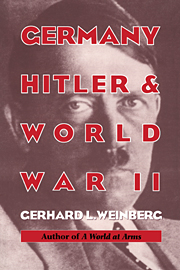Book contents
- Frontmatter
- Contents
- Preface
- Introduction
- Part I Background
- Part II The Nazi system
- 4 The Nazi revolution: A war against human rights
- 5 Propaganda for peace and preparation for war
- Part III Background for war
- Part IV World War II
- Appendix: the end of Ranke's history? Reflections on the fate of history in the twentieth century
- Index
5 - Propaganda for peace and preparation for war
Published online by Cambridge University Press: 05 August 2012
- Frontmatter
- Contents
- Preface
- Introduction
- Part I Background
- Part II The Nazi system
- 4 The Nazi revolution: A war against human rights
- 5 Propaganda for peace and preparation for war
- Part III Background for war
- Part IV World War II
- Appendix: the end of Ranke's history? Reflections on the fate of history in the twentieth century
- Index
Summary
Two explanations must precede any examination of National Socialist foreign policy in 1933 and thereafter. In the first place, the new regime did not come to power in Germany without previously developed views on the subject of an appropriate foreign policy for Germany. Quite to the contrary, although it was primarily internal disruption and the related reduction in the authority and prestige of the Weimar Republic which led to the appointment of Adolf Hitler to lead a new government, the newly installed masters had very much more detailed and far-reaching views about foreign policy than about internal and economic matters. These prior concepts must, therefore, be included in any review of developments.
Second, one should not attempt to make a clear distinction between domestic and foreign policy in studying National Socialism. There was no such separation in the reality of the time, and to speak of the priority of internal or foreign policy only obstructs any understanding of the evolution of the Third Reich. The concepts which can be recognized in the writings and speeches of Hitler and some of his followers during the time before their seizure of power, which then became historically significant in and after 1933, on the contrary called for a whole series of measures in both policy spheres. These measures were inextricably bound together, had to be fitted or adjusted to each other, and had mutual repercussions. This complex of interconnected concepts must be summarized first so that the attempt to implement them beginning in 1933 can be seen in the proper light.
- Type
- Chapter
- Information
- Germany, Hitler, and World War IIEssays in Modern German and World History, pp. 68 - 82Publisher: Cambridge University PressPrint publication year: 1995
- 1
- Cited by



